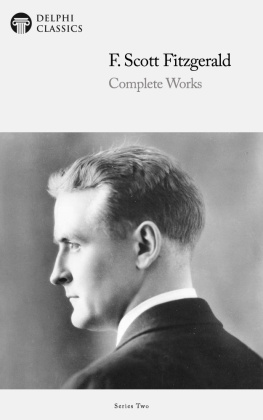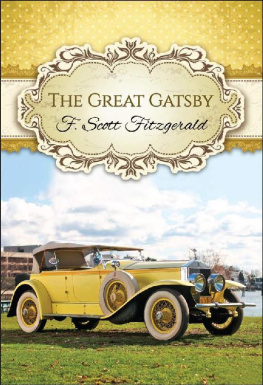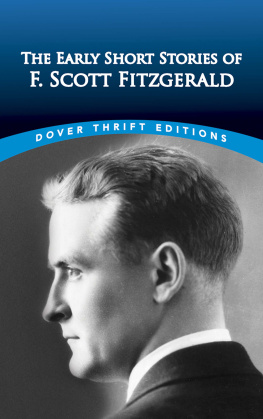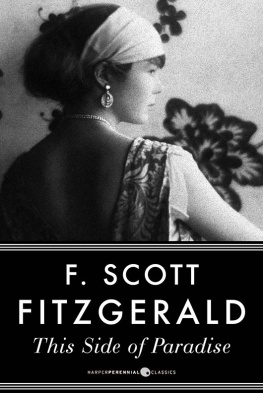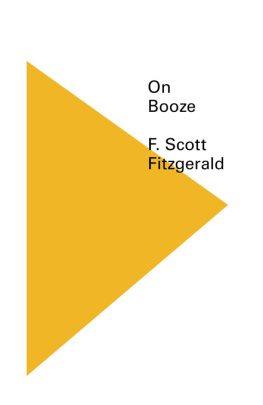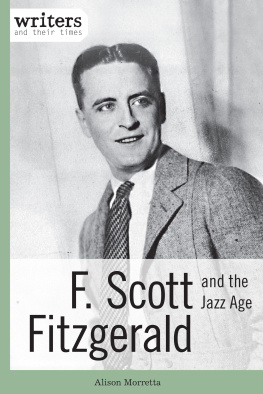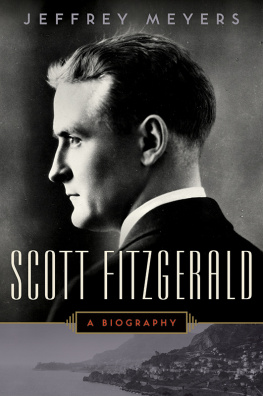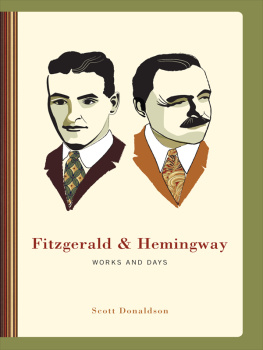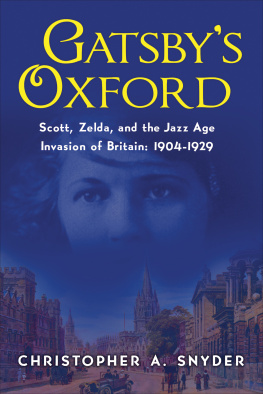F. Scott Fitzgerald - Tales of the Jazz Age
Here you can read online F. Scott Fitzgerald - Tales of the Jazz Age full text of the book (entire story) in english for free. Download pdf and epub, get meaning, cover and reviews about this ebook. year: 2011, publisher: SoHo Books, genre: Detective and thriller. Description of the work, (preface) as well as reviews are available. Best literature library LitArk.com created for fans of good reading and offers a wide selection of genres:
Romance novel
Science fiction
Adventure
Detective
Science
History
Home and family
Prose
Art
Politics
Computer
Non-fiction
Religion
Business
Children
Humor
Choose a favorite category and find really read worthwhile books. Enjoy immersion in the world of imagination, feel the emotions of the characters or learn something new for yourself, make an fascinating discovery.
- Book:Tales of the Jazz Age
- Author:
- Publisher:SoHo Books
- Genre:
- Year:2011
- Rating:4 / 5
- Favourites:Add to favourites
- Your mark:
- 80
- 1
- 2
- 3
- 4
- 5
Tales of the Jazz Age: summary, description and annotation
We offer to read an annotation, description, summary or preface (depends on what the author of the book "Tales of the Jazz Age" wrote himself). If you haven't found the necessary information about the book — write in the comments, we will try to find it.
Tales of the Jazz Age — read online for free the complete book (whole text) full work
Below is the text of the book, divided by pages. System saving the place of the last page read, allows you to conveniently read the book "Tales of the Jazz Age" online for free, without having to search again every time where you left off. Put a bookmark, and you can go to the page where you finished reading at any time.
Font size:
Interval:
Bookmark:
Now in Hadesas you know if you ever have been therethe names of the more fashionable preparatory schools and colleges mean very little. The inhabitants have been so long out of the world that, though they make a show of keeping up-to-date in dress and manners and literature, they depend to a great extent on hearsay, and a function that in Hades would be considered elaborate would doubtless be hailed by a Chicago beef-princess as perhaps a little tacky.
John T. Unger was on the eve of departure. Mrs. Unger, with maternal fatuity, packed his trunks full of linen suits and electric fans, and Mr. Unger presented his son with an asbestos pocket-book stuffed with money.
Remember, you are always welcome here, he said. You can be sure, boy, that we'll keep the home fires burning.
I know, answered John huskily.
Don't forget who you are and where you come from, continued his father proudly, and you can do nothing to harm you. You are an Ungerfrom Hades.
So the old man and the young shook hands, and John walked away with tears streaming from his eyes. Ten minutes later he had passed outside the city limits and he stopped to glance back for the last time. Over the gates the old-fashioned Victorian motto seemed strangely attractive to him. His father had tried time and time again to have it changed to something with a little more push and verve about it, such as HadesYour Opportunity, or else a plain Welcome sign set over a hearty handshake pricked out in electric lights. The old motto was a little depressing, Mr. Unger had thoughtbut now ....
So John took his look and then set his face resolutely toward his destination. And, as he turned away, the lights of Hades against the sky seemed full of a warm and passionate beauty.
* * * * *
St. Midas's School is half an hour from Boston in a Rolls-Pierce motor-car. The actual distance will never be known, for no one, except John T. Unger, had ever arrived there save in a Rolls-Pierce and probably no one ever will again. St. Midas's is the most expensive and the most exclusive boys' preparatory school in the world.
John's first two years there passed pleasantly. The fathers of all the boys were money-kings, and John spent his summer visiting at fashionable resorts. While he was very fond of all the boys he visited, their fathers struck him as being much of a piece, and in his boyish way he often wondered at their exceeding sameness. When he told them where his home was they would ask jovially, Pretty hot down there? and John would muster a faint smile and answer, It certainly is. His response would have been heartier had they not all made this jokeat best varying it with, Is it hot enough for you down there? which he hated just as much.
In the middle of his second year at school, a quiet, handsome boy named Percy Washington had been put in John's form. The new-comer was pleasant in his manner and exceedingly well dressed even for St. Midas's, but for some reason he kept aloof from the other boys. The only person with whom he was intimate was John T. Unger, but even to John he was entirely uncommunicative concerning his home or his family. That he was wealthy went without saying, but beyond a few such deductions John knew little of his friend, so it promised rich confectionery for his curiosity when Percy invited him to spend the summer at his home in the West. He accepted, without hesitation.
It was only when they were in the train that Percy became, for the first time, rather communicative. One day while they were eating lunch in the dining-car and discussing the imperfect characters of several of the boys at school, Percy suddenly changed his tone and made an abrupt remark.
My father, he said, is by far the richest man in the world.
Oh, said John politely. He could think of no answer to make to this confidence. He considered That's very nice, but it sounded hollow and was on the point of saying, Really? but refrained since it would seem to question Percy's statement. And such an astounding statement could scarcely be questioned.
By far the richest, repeated Percy.
I was reading in the World Almanac, began John, that there was one man in America with an income of over five million a years and four men with incomes of over three million a year, and-
Oh, they're nothing. Percy's mouth was a half-moon of scorn. Catch-penny capitalists, financial small-fry, petty merchants and money-lenders. My father could buy them out and not know he'd done it.
But how does he-
Why haven't they put down his income-tax? Because he doesn't pay any. At least he pays a little onebut he doesn't pay any on his real income.
He must be very rich, said John simply, I'm glad. I like very rich people.
The richer a fella is, the better I like him. There was a look of passionate frankness upon his dark face. I visited the Schnlitzer-Murphys last Easter. Vivian Schnlitzer-Murphy had rubies as big as hen's eggs, and sapphires that were like globes with lights inside them-
I love jewels, agreed Percy enthusiastically. Of course I wouldn't want any one at school to know about it, but I've got quite a collection myself. I used to collect them instead of stamps.
And diamonds, continued John eagerly. The Schnlitzer-Murphys had diamonds as big as walnuts-
That's nothing. Percy had leaned forward and dropped his voice to a low whisper. That's nothing at all. My father has a diamond bigger than the Ritz-Carlton Hotel.
Out of the blue-black bruise in the distance crept a long line of moving lights upon the desolation of the land, and the twelve men of Fish gathered like ghosts at the shanty depot to watch the passing of the seven o'clock train, the Transcontinental Express from Chicago. Six times or so a year the Transcontinental Express, through some inconceivable jurisdiction, stopped at the village of Fish, and when this occurred a figure or so would disembark, mount into a buggy that always appeared from out of the dusk, and drive off toward the bruised sunset. The observation of this pointless and preposterous phenomenon had become a sort of cult among the men of Fish. To observe, that was all; there remained in them none of the vital quality of illusion which would make them wonder or speculate, else a religion might have grown up around these mysterious visitations. But the men of Fish were beyond all religionthe barest and most savage tenets of even Christianity could gain no foothold on that barren rockso there was no altar, no priest, no sacrifice; only each night at seven the silent concourse by the shanty depot, a congregation who lifted up a prayer of dim, anaemic wonder.
Font size:
Interval:
Bookmark:
Similar books «Tales of the Jazz Age»
Look at similar books to Tales of the Jazz Age. We have selected literature similar in name and meaning in the hope of providing readers with more options to find new, interesting, not yet read works.
Discussion, reviews of the book Tales of the Jazz Age and just readers' own opinions. Leave your comments, write what you think about the work, its meaning or the main characters. Specify what exactly you liked and what you didn't like, and why you think so.


